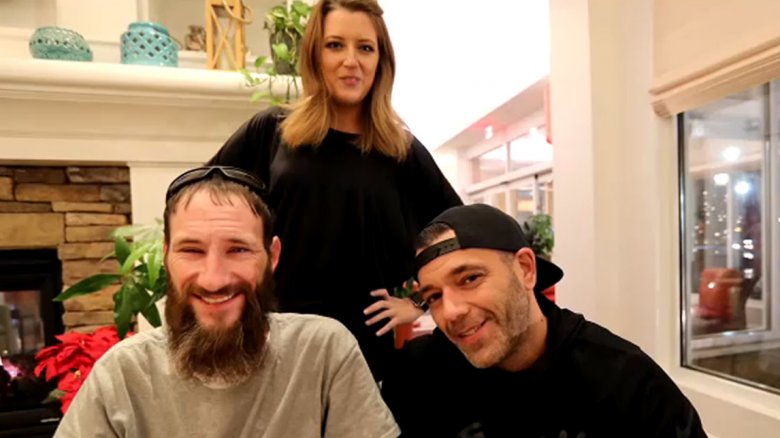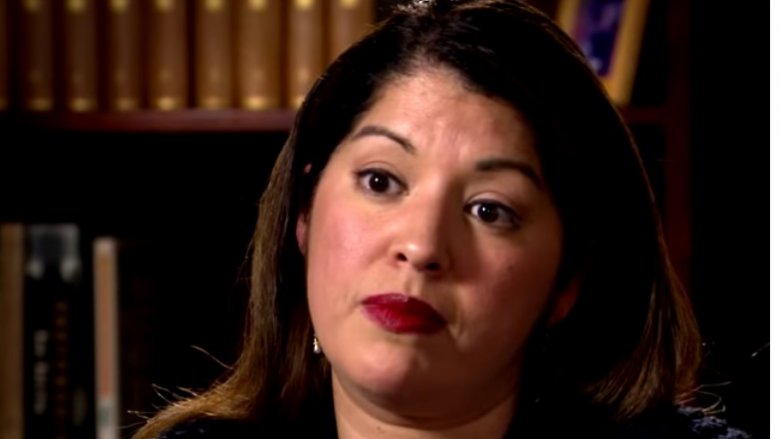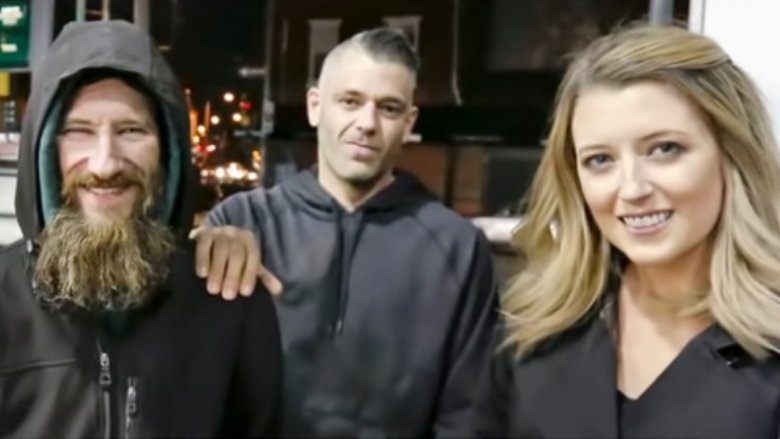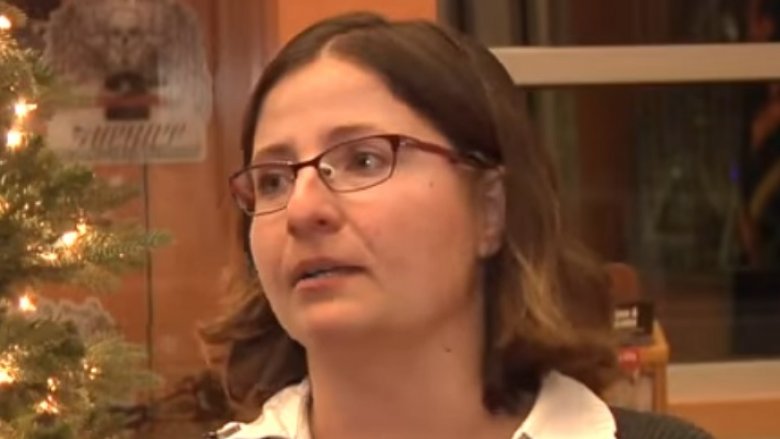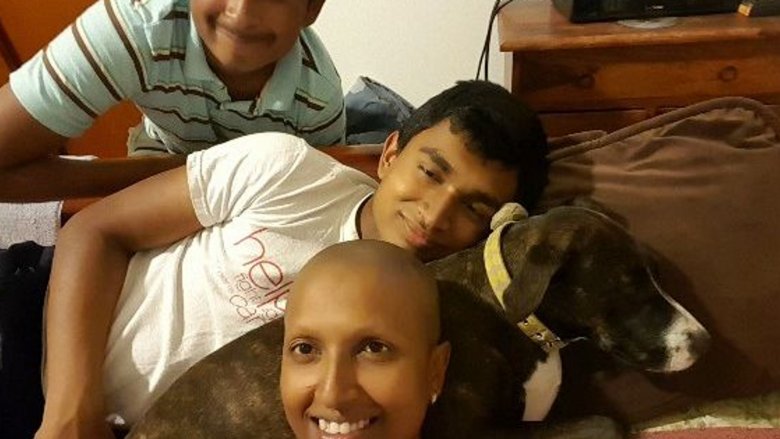The Biggest Scandals To Hit GoFundMe
Inconvenience is the second biggest enemy of charity, the first being pre-ghost Ebenezer Scrooge. If we think a cause or crisis is worth addressing, the only thing stopping us from chipping in is the hassle involved. Therein lies the beauty of the crowdfunding site GoFundMe. It does for charity what the microwave did for cooking: simplify it. There's no need to volunteer somewhere, no wondering whether the Red Cross will spend your whole donation on overhead costs, and people whose problems you might not otherwise hear about get a global megaphone in the form of a well-known website.
Of course, when you make it easy and appealing for huge groups of people to give strangers money, unsavory characters will slither from their hiding places with manufactured sob stories and outstretched digital hands. Other times, the mere fear of being swindled will lead to distrust and backbiting. These instances of toxic self-interest are relatively rare and the defrauded get refunded, but such controversies nonetheless erode the goodwill fostered by a site devoted to aiding strangers. Here are the biggest scandals to hit GoFundMe.
Doctor, doctor, give me the ruse
Monika Burgett didn't have a medical degree and might not have even earned her college degree, according to the Cincinnati Enquirer. But for over ten years, she convinced her husband that she was a physician. Playing doctor with her spouse was bad enough, but she somehow managed to trick actual doctors into treating her two-and-a-half-year-old son for cancer he didn't have. The Cincinnati Children's Hospital even allowed her to help administer treatment. The fact that this isn't a just highly implausible movie plot is deeply unsettling, but not nearly as disturbing the fact that trained medical professionals apparently didn't try to verify Burgett's claims independently, and instead needlessly administered methadone, Oxycodone, and other drugs to a small child.
In fairness, not everyone believed her. Burgett previously resided in Texas, where physicians didn't buy her story. In Cincinnati, however, doctors went along with it, and the organization Jewish Family Service even helped her get a rent-free apartment. On top of all that, Burgett posted "a photo of the boy, completely bald, no eyebrows, with tubes in his nose" on GoFundMe and said he had a brain tumor. People donated more than $40,000. As you might have guessed by now, Burgett had serious a serious mental problem, in particular factitious disorder imposed on another (FDIA), formerly known as Munchausen syndrome by proxy, whereby someone acts as if a person in their care is sick. A court sentenced Burgett to probation and ordered her to undergo psychotherapy.
A marathon of fraud
In 2013, Joanna Leigh publicly patted herself on the back for unseen acts of heroism after the Boston Marathon bombing. The reason no one saw them is that they never happened. As WTVR explained, Leigh went to a viewing party for the marathon but left before the attack. However, in her version of events, a bomb exploded ten feet away from her and knocked out. When she came to, not even brain damage, hearing loss, and "burning in her eyes" could stop her from helping other injured people. Clearly unconcerned about her own well-being, she didn't bother seeing a doctor for days. Imaginary injuries and nonexistent PTSD would leave her unable to work for least two years.
Posing as someone else, Leigh launched a GoFundMe campaign and netted $9,350. She also received nearly $30,000 through two victims' funds and a student fundraiser. To top it off, she got about $900 worth of free dermatology services, because if you can't have a clear conscience, you should at least have clear skin. Of course, Leigh probably had no conscience. Despite not deserving any money, she complained to NPR that One Fund Boston "only" gave her $8,000. The one thing she didn't bank on was people checking her story. Photographic, video, and eyewitness evidence thoroughly discredited her claims. In court, she confessed and was sentenced to probation and community service.
From viral to virulent
Johnny Bobbitt was both a villain and a victim. A former Marine, Bobbitt quit 14 months into a four-year commitment, per the Marine Corps Times. He had no record of deployment, but received a National Defense Service Medal. Eventually, he ended up homeless and on drugs, and at some point he crossed paths with New Jersey couple Kate McClure and Mark D'Amico. Together they tricked the internet into trying to help Bobbitt get off the streets.
It seems weird to think you would have to dupe people into assisting an actual homeless ex-Marine. But as McClure cynically explained in a text message, "I had to make something up to make people feel bad." That made-up something was a tear-jerking story about Bobbitt giving McClure his last $20 when she ran out of gas and got stranded on a roadside. The public's collective heart swelled, and GoFundMe donations for Bobbitt reached over $400,000.
While they got the money in an unacceptable way, once they had it, McClure and D'Amico could have really helped Bobbitt. Instead, they blew most of the money on a BMW, gambling at casinos, and luxury handbags. Bobbitt cried foul, authorities raided the couple's home, and the lie fell apart. All three were charged with theft and conspiracy.
Charity with strings attached
Fred Barley's story was like a blanket for the human heart. Left homeless after a fight with his mother, Barley (above) embarked on a six-hour, 50-mile bike ride Barnesville, Georgia, and lived in a tent so he could register for college classes. When approached by police, Barley, who's black, became apprehensive because of news stories about altercations between black people and law enforcement. But the officers not only treated him kindly, they paid for him to stay at an inn. When Casey Blaney heard about Barley's story, she felt compelled to help. And what better way than to set up a GoFundMe account and finance his education? People donated $184,000.
If this story sounds too good to be true, it's because you haven't read the rest of it. Per the Atlanta Journal-Constitution, Barley and Blaney began bickering over who would manage the money. Blaney accused Barley of wanting money "to be handed to him" and started questioning the veracity of his story. Barley argued that Blaney was being a control freak. In reaction to the controversy, GoFundMe froze the account. Meanwhile, rumors circulated that Barley wanted to go to another town. Some Barnesville residents felt betrayed or accused him of outright fraud. Others suggested that Blaney intended to keep the donations herself. She and barley eventually agreed to place the money in a trust, since they clearly didn't trust each other.
GoBullyMe
In 2017, Keaton Jones, an 11-year-old boy from Tennessee, broke the internet's heart with a woeful speech about being bullied. A slew of celebrities, including Chris Evans, Cardi B, and Snoop Dogg made online overtures of sympathy and friendship. Joseph Lam, a New Jersey man with zero connection to the Jones family, started a GoFundMe campaign to "stand up for Keaton," though it's really unclear how money would do that. Regardless, donors stood up to the tune of $58,274. Newsweek pointed out that Liam's grand gesture raised some giant red flags. There was no actual plan for what to do with the money, and although he claimed that he gave Keaton's mom $28,000, that turned out to be a pile of bull.
Some of those red flags were literal flags, namely the Confederate ones Keaton and his mother, Kim, posed with in photos. Worse, Kim made controversial remarks about "butthurt Americans" after the deadly Unite the Right rally in Charlottesville. MMA fighter Joe Schilling claimed that when he invited Keaton to see him beat people up in a non-bully way, Kim was only interested in getting money. When Schilling criticized her, she apparently replied, "What happened to us whites sticking together?" Suddenly, the anti-bullying effort seemed tainted. Multiple celebrities distanced themselves, and internet users suggested that Keaton deserved to be picked on.
When lying becomes child abuse
Lots of parents deceive their children, mainly about where babies and Christmas presents come from. But certain lies are typically off limits because they amount to abuse. Among them is telling a healthy child that they're fatally ill. However, some parents have crossed that line to bolster the believability of GoFundMe scams.
In 2017, a Florida couple tricked their 13-year-old son into believing he had terminal brain cancer. The parents claimed medical treatment would render him "a vegetable," according to investigators. For eight months, the boy believed he was dying. He told teachers and others at school and was understandably frightened at times. Someone got suspicious and alerted authorities when the parents started selling T-shirts to raise money. It's unclear how much they earned from GoFundMe, but they made $140 off of nine shirts.
Nevada resident Victoria Morrison took this already unthinkable scheme to an even more disturbing extreme. After discovering her son had a "treatable childhood illness," Morrison grossly exaggerated his condition. She told her son he had leukemia and kept him out of school for months. Eventually, she claimed he died, pretended to mourn him at a phony memorial service and said he was cremated. Morrison was foiled by the absence of a death certificate and the presence of her very-alive son, but not before raising roughly $2,000 on GoFundMe. She was sentenced to 5 to 12.5 years in prison.
An accused dog abuser somehow stoops even lower
There's nothing more odious than someone who abuses defenseless people or animals. However, if police are right about Reid Herjo, there might be one thing that's just as odious. According to authorities, Herjo abused his German Shepherd, Atlas, to the point that that the dog needed "emergency surgery," and then made $14,065 by lying about it on GoFundMe.
Atlas didn't undergo surgery because he died "under suspicious circumstances." And contrary to what Herjo told his 693 donors, Atlas' injuries probably didn't come from getting hit by an ATV. Experts determined that the dog was likely beaten, and it likely wasn't the first time. During the course of six weeks in 2018, the long-suffering German Shepherd went to the vet for multiple "accidents." One time, Atlas supposedly fell down stairs. Later, he allegedly fell down a hill. Unsurprisingly, Herjo's explanations didn't add up. Officers charged him with animal cruelty and theft by deception.
A radio host does the despicable
Cleveland radio host J.G. Spooner had treachery running through his veins. However, like many skilled con artists, he hid his dishonesty behind a self-aggrandizing display of fake virtue. In 2015, Spooner volunteered to promote a GoFundMe campaign to cover the medical bills of Allyson Thadeus-Zappe, "a woman he knew since elementary school," per Cleveland.com. Thadeus-Zappe had cystic fibrosis, which ravages sufferers' lungs with relentless infections and increasingly hinders their breathing. Naturally, she and her family welcomed Spooner's help.
Then he pulled the rug from under them. Spooner changed the GoFundMe password and stole over $6,000 from the account. Thadeus-Zappe passed away weeks later, much of which she spent being upset about the stolen funds. When her family confronted Spooner, he pointed the finger at GoFundMe and made a show of threatening to "take legal action." Clearly, this wasn't a sustainable lie. Neither was an unrelated scheme in which Spooner made over $8,500 pretending to rent out a home he didn't own to strangers on Craigslist. In court, he pleaded guilty to theft and was sentenced to 30 months behind bars.
Go fund your own heart transplant
Whoever said you can't put a price on life got it backwards. Staying alive is extremely pricey, which probably explains why, according to Market Watch, a third of all GoFundMe campaigns around the world are geared toward paying medical expenses. When Hedda Martin needed a new heart, GoFundMe was the only reason her clinic didn't refuse to give her one. Martin needed $10,000 to cover the 20 percent insurance copay for anti-rejection drugs. Without it, the Spectrum Health Richard Devos Heart and Lung Transplant Center would refuse to operate on her. The clinic suggested that to save her life, Martin should hold a fundraiser.
That ironically heartless response caught the attention of Congresswoman Alexandria Ocasio-Cortez, who tweeted the clinic's letter to her then-1.4 million followers. It was re-tweeted 28,000 times. Outraged internet users gave Spectrum Health a piece of their minds, and GoFundMe donors gave Martin the money she needed. Sadly, not everyone is so lucky. Vice reported that when Shane Boyle attempted to use GoFundMe to finance a month's supply of insulin, he came up $50 short of his $750 goal and died as a result. Obviously, GoFundMe isn't meant to insure your health, but apparently neither is actual health insurance.
Parishioners pay for the sins of their father
Priests are all about forgiving sins and keeping them secret, but there's a point where that goes too far and the Department of Homeland Security steps in to put a stop to it. Mississippi priest Lenin Vargas-Gutierrez and the Catholic Diocese of Jackson reached that point in 2018. As reported by the Dispatch, in 2015 Vargas-Gutierrez admitted to a bishop that he had HIV. While he and the church had every right to hide his condition, they did it in every wrong way possible.
Vargas-Gutierrez pretended to have cancer, asked parishioners to fund his treatment, and then used the money on a dating site for people with HIV, "a sexual addiction facility for priests," and other mostly non-medical expenses. He also asked people to help pay for a nonexistent orphanage in Mexico, which they happily did. He received $9,210 through GoFundMe, a $21,500 check from his own church members, and a $2,300 "love offering" from another church. The DHS clearly wasn't cool with all the love Vargas-Gutierrez was getting, and conducted a raid on his diocese.
Law enforcement determined that the Diocese of Jackson absolutely knew the priest was lying to parishioners but decided dishonesty was the best policy. Maybe they figured Vargas-Gutierrez could confess his sins later and be forgiven. If so, they were kind of right — he wasn't charged with anything.
When all else fails, blame your boyfriend
You know those infomercials that promise to solve a nonexistent problem with a fake, laughably stupid solution? Vedoutie Hoobraj did a more diabolical version of that. In 2014, she convinced her boyfriend, her two sons, her entire community, and probably her dog that she had cancer. Then she tried to advertise a cancer-fighting fad diet online. Lohud reported that Hoobraj impersonated a doctor via email and instructed her boyfriend to earn more money, minimize her stress, and keep her happy in the bedroom to boost her self-esteem. She later got online and said she was able to combat a baseball-sized tumor and worse-than-dire odds with a special juicing regimen she learned from a guru.
Hoobraj shaved her head, forged medical records, and even used the name of a real oncologist who died in an earthquake to mask her ruse. Her fakery proved lucrative. She got $25,000 through a GoFundMe account started by her son, who – let's not forget – thought his mom was dying. Community members raised another $16,000 with a spaghetti dinner. Hoojrab also used her illness to manipulate people on Kickstarter so they would help her fund a restaurant. When the walls started closing in, she moved to a different state. When that failed to stave off punishment, she told a court that her now-ex-boyfriend orchestrated the whole thing, even cutting her hair while she slept. She received a two-year prison sentence.
The audacity of dope
All Jeremiah Smith wanted was to fill his days with pot, booze, dart tournaments, and video games. By themselves, these were perfectly harmless goals, assuming Smith didn't drink and throw darts at the same time. But what he did to make his mundane dreams come true was so ambitiously ridiculous you'd have to be high to attempt it.
Per the New York Daily News, Smith told his wife and a friend that he had Stage 4 terminal cancer and only had 18 to 25 months left to live. Then he lowered it to six months. Somehow, he was going to have to convince a group of people who knew and cared about him, one of whom lived with him, that he was not only sick, but actually about to die. He had no medical records, no oncologist, and for obvious reasons never let his wife go with him to appointments.
Smith quit his job and proceeded to not die while devastated people performed loving acts of charity. His friend Darlene Asher raised $6,000 for him through a dart tournament and told CBS that some friends helped pay for his wedding. Smith made over $6,800 through GoFundMe. In total, he stole over $23,000, but got caught because his wife finally got suspicious. He pleaded guilty in court and got sentenced to 10 years of probation.
